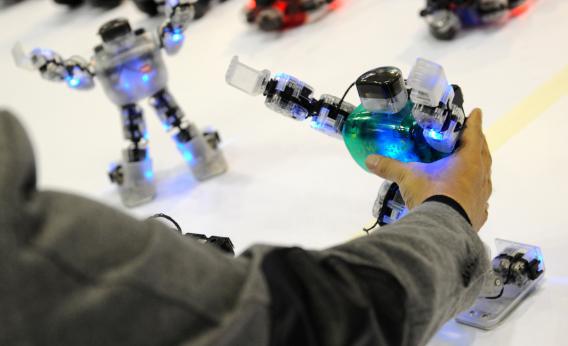If you want to survive the robot invasion of white-collar jobs, you need to invest in obsequiousness. A strong fashion sense might help, too.
Yesterday, Slate joined the New America Foundation and Arizona State to hold a Future Tense event called “Will Robots Take Your Job?” Our host, Slate technology Farhad Manjoo, discussed his fascinating series by the same name, in which he explored the idea of robots and automation in the law, medicine, science, even journalism. As Farhad discussed with his first set of panelists, one challenge is whether robots can do nuance. Primary-care physician Sarah Kramer; Robbie Allen of Automated Insights, who is trying to automate sports journalism; and Cornell University’s Michael Schmidt, who is teaching robots to create scientific equations, discussed the pros and cons of machines with white-collar day jobs. Dr. Kramer pointed out that while robots could enter the diagnostic sphere—Jeopardy! victor robot Watson might soon help diagnose diseases—human doctors will still have a role by helping contextualize and strategize treatment. Allen agreed, saying that the “Will robots replace me?” query is a fallacy: Just because a robot can do something doesn’t mean a human won’t have a complementary role.
Ah, but what will that complementary role be? Joining Farhad to discuss the post-robot-invasion economy were Tyler Cowen, author of The Great Stagnation and blogger at Marginal Revolution; Martin Ford, author of The Lights in the Tunnel; and Michael Lind, policy director of New America’s Economic Growth Program. Should robots end up dominating the white-collar work force, the panel discussed, one possible result would be an even more service-based economy—so, said Cowen, many may find work as personal shoppers, say, or other service providers. Should that be the case, perhaps it will be better for schoolkids to learn deference, friendliness, and fashion sense than science and technology, proposed Lind. Of course, that assumes that the robot economy increases productivity and wealth for people. Should the rising robot-tide not lift all boats, one solution, says Ford, would be to create a guaranteed income for everyone—but that would be a political minefield.
You can watch a replay of the event here. Future Tense, a partnership of Slate, the New America Foundation, and Arizona State University, holds periodic events in Washington, D.C., to explores how emerging technologies will transform society and public policy. Want to find out about upcoming events? Sign up today.
If you’re now a little afraid of robots taking over your job, calm your nerves with the below montages. If after watching cats and babies riding Roombas you’re still suffering from robot-paranoia, perhaps the second video, showing robots falling down, will restore your confidence in humanity.
